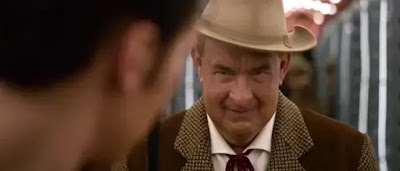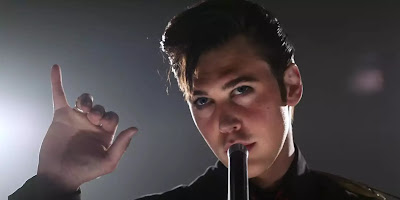The King is Dead. Long Live the King (Accept No Further Substitutions)
or
"You're a Devil in Disguise"
"The people
gave their money and they gave their screams, but the Beatles gave their nervous systems, which is a much more difficult thing to give."
George Harrison
Baz Luhrmann is a favorite in these quarters for his brio and audaciousness, but his "throw-it-at-the-wall-and-see-if-it-sticks" approach to film-making can be off-putting to purists. Too many mash-up's, too many liberties taken with authenticity, too many anachronisms.
Yeah, yeah. So what?
Baz Lurhrmann makes kaleidoscopic multi-media myths with the emotional histrionics of grand opera, and a design sense that is stuffed with equal parts sub-text and glitz. So, if Lurhmann was going to continue the trend of making movies dissecting the lives of pop artists (Bohemian Rhapsody, Rocketman), he would laser-in on the career of Elvis Presley, the culture-described King of Rockn'Roll, who flashed like a meteorite in the the 1950's and crashed to Earth, dying at the age of 42.Not everyone might know the story of Elvis, although they might know the prevailing culture—the hoardes of imitating Elvi, the wedding chapel versions, the general prevalence of over-the-top glitz, the rotation of movies on TCM, and maybe the vast catalog of music he produced. Presley was born in poverty in Tupelo, Mississippi and became a sensation in the fledgling field of rockabilly and Rockn'Roll, which he'd morphed from their origins in Rhythm n' Blues. His stage-work was what made him famous, as he dervished and swiveled on stage that sent bobby-soxers swooning and the morality police into over-drive. He became a pop sensation with equal efforts to exploit him and contain him—his first appearance on "The Ed Sullivan Show" would only show him from the waist up.*
There was a brief period of inactivity after he was drafted into the Army (which became the origins of the musical "Bye-Bye, Birdie")—where he met his future bride, Priscilla at the tender age of 14—and once his tour was over returned to recording and a career making movies in Hollywood, which he found lucrative but ultimately unsatisfying as, after making a couple of dramatic roles (he idolized James Dean), he was relegated to made-to-order musicals to serve the fan-base but not much else.
To jump-start his career in the late 60's, he made a couple of television specials that recalled the old Elvis, pre-Hollywood, revived his recording career (and critical regard) and contracted a long-standing "residency" in the big International Hotel showroom in Vegas. The grueling schedule had a detrimental effect on his health, his marriage, and his life, and he began taking drugs—he'd previously sworn off any drugs or alcohol (there was a lot of alcoholism in his family)—to maintain his commitments. He finally succumbed to a heart attack.
By now, we've come to expect a bit of gloss in our musical bio-pics, especially when it comes to the darker aspects of celebrity (can't risk discouraging the ambitious, now, can we?) and Elvis has plenty of that. And it's not just in little details (Elvis is coerced into enlisting in the military to promote a wholesome image rather than—as the truth is—being drafted) so much in the big arc of the story—that Elvis (Austin Butler), a child inspired and enraptured by Rhythm and Blues and Gospel music, is enticed by success and then trapped in it by music promoter—and con-man—Col. Tom Parker (Tom Hanks). There's a lot of truth in that—Parker was a rascal—but Elvis was not so much the innocent as portrayed in the movie. But, then, Luhrmann wouldn't have been able to match the story to more operatic roots.
And that opera is "Faust." Based on Goethe's play, it is about a philosopher who, to attain transcendence, makes a deal with the Devil at the cost of his soul. Here Col. Tom is the Devil, who tempts Elvis with fame and fortune, controlling his life—despite Elvis' repeated acts of rebellion—until the singer is contracted to endure a brutal performance schedule from which he cannot escape that will eventually kill him. The movie is narrated by Parker, who constantly makes the case that he is innocent of Elvis' fate, but the story is rife with evidence that he's a con man, a grifter, and—in a touch that's a little too much on the prosthetically enlarged nose—a provider of "forbidden fruit." Giving audiences, in his words, "feelings they didn't know they should feel." When he sees the audience's reaction to Elvis' jittery first stage performance, he stalks him in a carnival house of mirrors to propose his business deal, delivered at the top of a stopped ferris wheel. The pact is completed on a precarious foundation.
Hanks' performance, like his other rare villainous roles is over-the-top. Sporting a vaguely Germanic accent—Parker, whose real name was Andreas Cornelis van Kuijk, was Dutch—and swaddled in layers of latex, he is all twinkling malevolence and insinuation, always upping the ante for his targets and hedging his personal bets. Luhrmann has him rising from a hospital bed to descend to his own version of Hell, a darkened casino showroom festooned with slot machines; Parker was an insatiable gambler and used the Elvis fortune to pay off his soaring debts.
But every villain must have a sympathetic victim and Luhrmann's ace in the hole is Butler, whose prettified Elvis is all guileless mamma's boy. Butler resembles Presley in the all-important eyes, but his jawline and cupid bow mouth are more feminine than the real guy; the resemblance really kicks in when Butler sports a cocky grin—it's just that Luhrmann offers few opportunities for that expression. Except on-stage, and that's where Butler's performance goes full-tilt. In fact, when Luhrmann's directorial energy flags mid-stream that's when Butler's stage theatrics take over, giving the movie a boost right when it needs it most.At times, it's uncanny; the director uses a lot of split-screens of archive footage of the hysterical crowd reactions (it would be tough to duplicate today) and every-so-often Elvis pops into it and it takes a moment to realize if it is Elvis Presley or Butler—it's always Butler until towards the end of the film when footage of the real singer is used in a montage of images culminating in a stage performance of "Unchained Melody" where a clearly out-of-shape and exhausted Presley gives a powerhouse performance and, making it through it, gives a delighted, spent smile to the audience. That footage alone slaps away any disparaging "fat-Elvis" comments and makes you realize what an amazing talent the man had...even at the end.Which, ironically, makes Butler's performance that much more impressive. He sings during the concert footage and does a great job as an Elvis imitator (according to ABC News, there are more than 35,000 as of 2002—I wonder what the unemployment rate for them is after Covid?). Well, their job is just that much more difficult now. There can be no more half-measures, no lame karate moves. Butler rises to the occasion in the Elvis royalty; if not quite The King, certainly an excellent torch-bearer.Oh, one other thing: Luhrmann makes an interesting through-line of the story, taking Elvis from a little kid fascinated with gospel and the devotional reactions of the congregation and extending it to its culmination in the International's Vegas show-room, seeing it as its own Church of Elvis and his own personal ecstasy—while for Parker it's his own personal Hell, both trapped in prisons of their own making.
Damned clever, that Luhrmann.Okay. I'm leaving the blog-post. You've been a fantastic audience. (Thenkew! Thenkewvermuch.)

























